For people looking to switch to a plant-based, ketogenic, or low-calorie diet, but love milk, almond milk is one of the best alternatives.
Sales of almond milk are expected to increase globally to $13.25 billion by 2025, and the drink is currently ranked number one in non-dairy milk beverages. Almond milk is an excellent substitute for dairy milk for people who want to avoid traditional cow’s milk, no matter the reason.
Despite these benefits, not everyone loves the taste of almond milk, and some people can’t drink the beverage due to nut allergies.
Luckily, there are plenty of substitutes for almond milk.
Here's our list of the best almond milk alternatives to make the swap!
10 Plant-Based Alternatives to Almond Milk
You have several alternative milk options if you want to commit to a plant-based, low-calorie, or ketogenic diet that avoids dairy products. These include:
- Coconut milk
- Soy milk
- Flax milk
- Pea milk
- Rice milk
- Hazelnut milk
- Hemp milk
- Quinoa milk
- Oat milk
- Cashew milk
Below is a short description of each alternative milk option and its nutritional values.
It may be helpful to compare this data with the nutritional profile of unsweetened, commercial almond milk to understand the differences.
For reference, the USDA lists the following nutritional content for one cup of almond milk:
- Calories: 39
- Protein: 1g
- Fat: 2.5g
- Carbohydrates: 3.4 g
- Sugar: 2g
- Fiber: .5g
1. Coconut Milk
Coconut milk is an alternative plant-based alternative to almond milk for those with tree nut allergies.
Coconut milk is made by squeezing the white meat of a coconut. Most manufactured coconut milks add water, thickeners, and fortified nutrients to make the product similar in consistency to cow’s milk.
Coconut milk typically has a slightly tropical flavor, making it an excellent choice for cooking or adding to plant-based puddings or beverages.
An 8-ounce (one cup) serving of unsweetened coconut milk (not canned) provides:
- Calories: 46
- Protein: 0g
- Fat: 4g
- Carbohydrates: 1g
- Sugar: 1g
- Fiber: .3g
Related: Almond Milk vs. Coconut Milk
2. Soy Milk
Soy milk is made from soybeans soaked overnight, then blended with water. This milk is the closest to cow’s milk regarding plant-based alternatives due to its high protein content.
Store-bought soy milk also contains fortified nutrients like calcium, Vitamin B, and potassium.
Soy milk is not nut-based, so it is safe for people with tree nut allergies. However, it's off-limits for people with soy allergies. It’s also got a somewhat sweet flavor which is pleasant in cereal or coffee.
A cup of soy milk contains around:
- Calories: 105
- Protein: 6g
- Fat: 4g
- Carbohydrates: 12g
- Sugar: 9g
- Fiber: .5g
Related: Almond Milk vs. Soy Milk
3. Flax Milk
Flax milk is an excellent alternative to almond milk for those with nut allergies or those looking for a heart-healthy option.
It is made from ground flax seeds and is full of omega-3 fatty acids that can positively affect your heart, brain, and digestive system.
Flax milk tends to have an earthy, nutty flavor that works well in porridges, oatmeal, and strong coffee or tea.
A cup of flax milk can provide you with:
Calories: 45
Protein: 2g
Fat: 3g
Carbohydrates: 6g
Sugar: 1g
Fiber: 0g
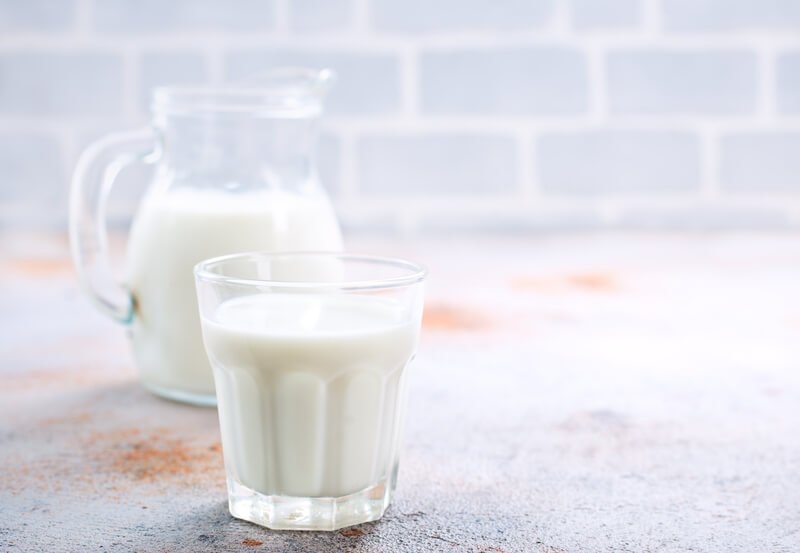
4. Pea Milk
Pea milk is an excellent almond milk substitute for people who want extra protein in their diet.
While almond milk only contains around 1g of protein, pea milk contains about 8g of protein for one cup.
Pea milk is also safe for people with nut allergies and has a slightly creamier, richer taste than other plant-based milk.
Because pea milk is made from peas, it also contains several beneficial nutrients like calcium, Vitamin D, and iron, which can benefit your overall health.
An 8-ounce serving of pea milk contains the following nutrients:
- Calories: 80
- Protein: 8g
- Fat: 4.5g
- Carbohydrates: 2g
- Sugar: 0g
- Fiber: .0g
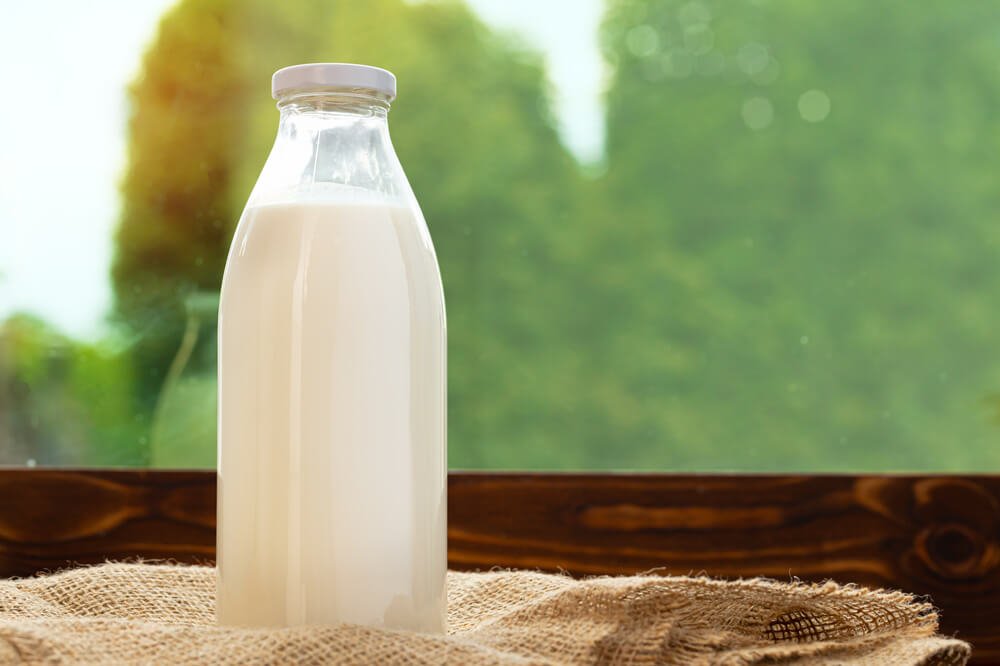
5. Rice Milk
Rice milk is a popular plant-based drink made from white or brown rice, water, and sometimes additives such as thickeners or sweeteners.
This beverage is a good choice for people with allergies or who dislike the taste of nut milk.
Rice milk tends to give off no aftertaste and works well in almost any culinary use. Due to rice’s high carbohydrate content, rice milk is high in carbs, making it unsuitable for people on the ketogenic diet.
One cup of rice milk contains:
- Calories: 115
- Protein: .7g
- Fat: 2g
- Carbohydrates: 22g
- Sugar: 13g
- Fiber: .7g
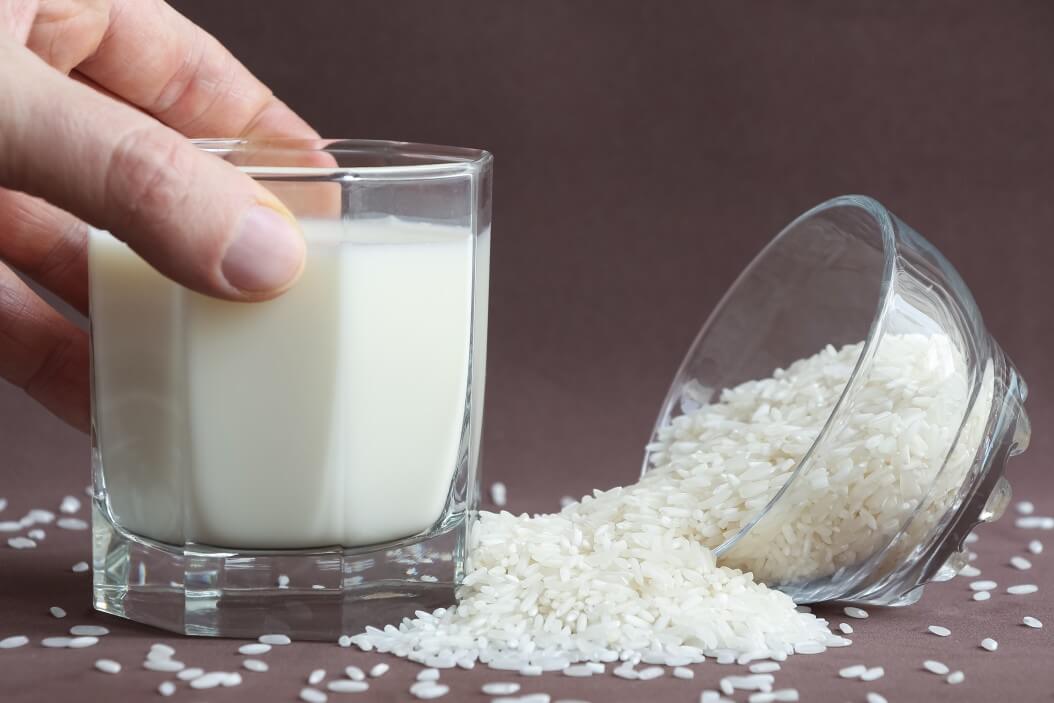
6. Hazelnut Milk
Hazelnut milk is plant-based milk made from hazelnut, another type of tree nut.
Hazelnuts give this beverage a slightly high-end reputation, as hazelnuts are often enjoyed as an ingredient in decadent desserts, candies, and a particular chocolatey spread.
Depending on the brand of hazelnut milk you use, you may experience a creamy, sweet flavor profile or more of a nutty hazelnut taste.
A cup of unsweetened hazelnut milk may contain the following range of nutrients, which make it similar to almond milk in nutritional profile:
- Calories: 70-100
- Protein: 4-9g
- Fat: 3g
- Carbohydrates: 1g
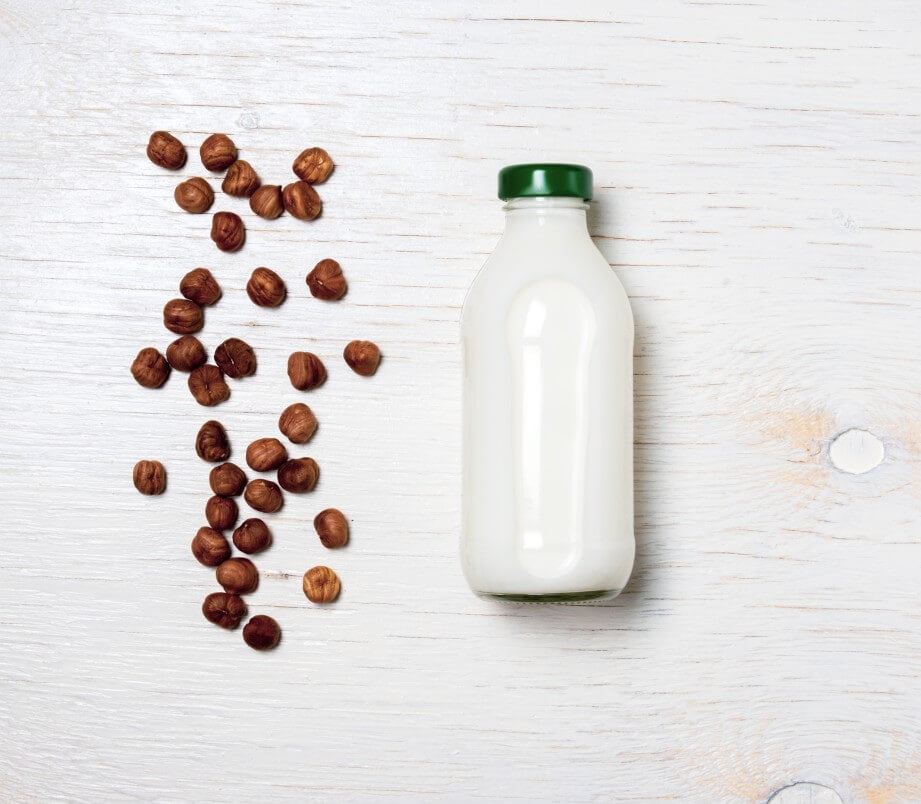
7. Hemp Milk
Hemp milk is made from hemp seeds from the Cannabis sativa plant. The hemp seeds are soaked and ground in a blender with water and other additives like sweeteners and thickeners.
Hemp seeds boast a slightly nutty flavor, similar to sunflower seeds, that translates to hemp milk. This plant-based milk is safe for people with nut allergies since it is made of seeds instead of tree nuts.
One cup of hemp milk contains:
- Calories: 60
- Protein: 3g
- Fat: 5g
- Carbohydrates: 0g
- Sugar: 2g
- Fiber: .5g

8. Macadamia Milk
Macadamia milk is made the same way as almond milk by blending soaked macadamia nuts in water, blending and straining to create a light, airy plant-based beverage.
Macadamia milk is ideal for people on the keto diet, as it contains a minimal amount of calories and carbohydrates.
Macadamias are tree nuts, so this isn’t a good option for people with nut allergies.
Macadamia milk works great as an additive to coffee, tea, and puddings or porridges due to its subtle flavor.
An 8-ounce glass of macadamia milk contains:
- Calories: 50
- Protein: 1g
- Fat: 5g
- Carbohydrates: 1g
- Sugar: 0g
- Fiber: .1g
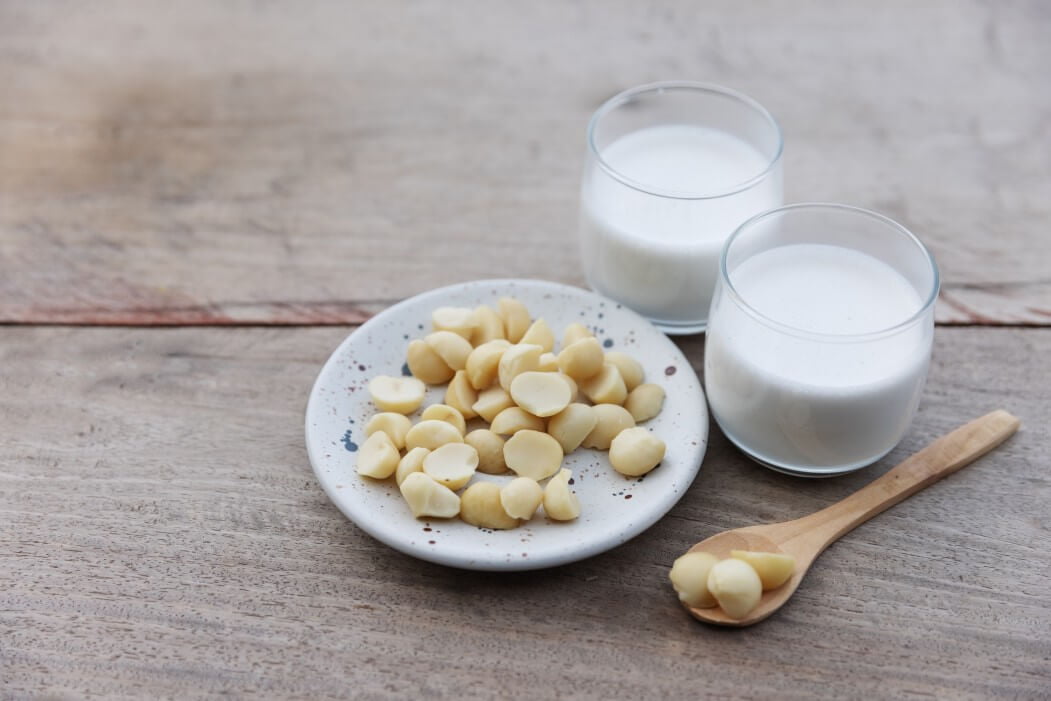
9. Oat Milk
Oat milk is made by soaking whole oats in water, blending, and straining the mixture until it becomes creamy.
This plant-based milk is sweeter and creamier than other nut milk, but it is higher in carbs which can be beneficial or not depending on your diet choices.
It also contains soluble fiber, which can help you feel fuller longer due to its effect on the digestive system.
Oat milk has the following nutritional values for one cup:
- Calories: 120
- Protein: 3g
- Fat: 5g
- Carbohydrates: 16g
- Sugar: 7g
- Fiber: 1.9g
Related: Almond Milk vs. Oat Milk
10. Cashew Milk
Cashew milk is an excellent alternative for those who like almond milk’s nutritional profile but dislike the taste.
Cashew milk is creamier and lighter in flavor and provides a similar nutritional profile to almond milk, especially when fortified in store-bought options.
It’s made the same way as almond milk by blending cashews with water and straining any remaining pulp. However, this type of milk is not suitable for people with nut allergies since cashews are tree nuts.
An 8-ounce glass of cashew milk contains:
- Calories: 24
- Protein: 1g
- Fat: 2g
- Carbohydrates: 2g
- Sugar: 0g
- Fiber: .0g
Related: Almond Milk vs. Cashew Milk
Reasons You May Avoid Almond Milk
The most common reasons people tend to avoid almond milk are a tree nut allergy, a potential lack of nutrients, a perceived unpleasant taste, and environmental factors.
You Have a Tree Nut Allergy
Almonds grow on the Prunus Dulcis tree and are one of the most common food allergens in the world.
A 2018 journal article reports that between .2% and .5% of children and adults in the U.S. have an almond allergy, and a 2021 article found that 9% to 15% of people with tree nut allergies are also sensitive to almonds.
If you suffer from an almond allergy or are allergic to other tree nuts, you likely want to avoid almond milk.
Nutritional Profile
While whole, raw almonds are jam-packed with nutrients like healthy fats, protein, and fiber, these don’t always translate to almond milk made at home.
Store-bought almond milk is typically fortified with nutrients like calcium, but most almond milk remains low in fat, carbohydrates, and protein.
If you need more protein or fat in your diet, you may prefer a different type of plant-based milk to meet your needs.
For example, pea milk contains more protein than almond milk, and coconut milk contains a bit more fat.
You Don’t Enjoy the Taste or Consistency
For some people, the taste of almond milk keeps them from enjoying the beverage’s benefits.
Almond milk varies by brand, so that you may experience an “almondy” taste with some rather than others.
If you don’t enjoy the flavor of almonds, you may want to avoid the drink or experiment with different brands or homemade recipes before finding one that works for you.
In addition to flavor issues, some people dislike the consistency of almond milk. Store-bought brands use additives and thickeners like carrageenan and xantham gum to create a gummy or thick texture, but these ingredients may have negative effects on your health.
If not strained thoroughly, homemade almond milk can feel bumpy or grainy. This texture and consistency also causes people to shy away from almond milk.
Environmental Factors
The environmental impact of growing and harvesting almonds has caused some people to turn away from drinking almond milk.
The main issue relates to the nearly gallon of water it takes to grow a single almond. Due to recent California droughts, some have blamed the demand for almonds for worsening the issue.
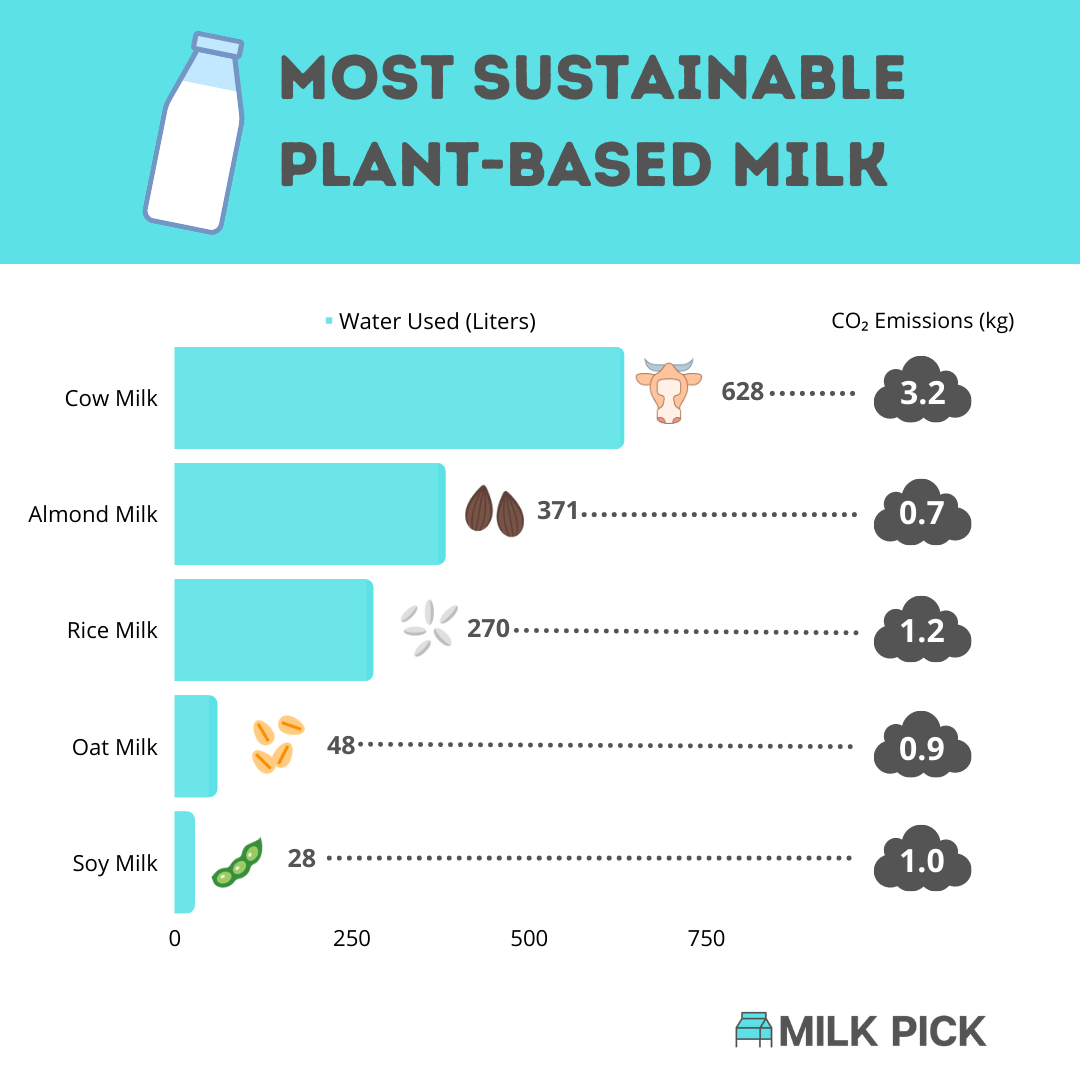
Although other nuts require nearly the same amount of water to grow, you may prefer a different type of milk if you are eco-conscious.
Explore Almond Milk Alternatives to Find the One that Works For You
No matter your reasons for avoiding almond milk, you have plenty of alternative options to explore.
Some plant-based milk, like cashew, coconut, and hemp, are great options for those on the keto diet, while others, like oat and soy, work well for those with tree nut allergies.
Experiment with different types of non-dairy milk until you find one that matches your dietary needs and taste preferences.
